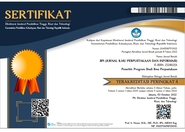GENERATION Z'S MULTITASKING LEARNING STYLE AND ITS IMPLICATIONS FOR THE DEVELOPMENT OF INFORMATION SERVICE TECHNOLOGY IN LIBRARIES
Abstract
Keywords
Full Text:
PDFReferences
Anderson, J. Q., & Rainie, L. (2012). The future of the internet: Millennials will benefit and suffer due to their hyperconnected lives. Pew Research Center. https://www.pewresearch.org/internet/2012/02/29/millennials-will-benefit-and-suffer-due-to-their-hyperconnected-lives/
Cameron, E.A. and Pagnattaro, M.A. (2017) Beyond Millennials: Engaging Generation Z in Business Law Classes. Journal of Legal Studies Education, 34, 317-324. https://doi.org/10.1111/jlse.12064
Daily Telegraph. (2023, October 10). Sydney libraries extend opening hours, provide snacks and stress relief for students. https://www.dailytelegraph.com.au/new-south-wales-education/sydney-libraries-extend-opening-hours-provide-snacks-and-stress-relief-for-students/news-story/fcb54d458bac0021c1e924f2ad8cfd52
Ganggi, R. I. P. (2018). Mempersiapkan Pustakawan Multitasking untuk Melayani Pemustaka Generasi Z. Anuva: Jurnal Kajian Budaya, Perpustakaan, Dan Informasi, 2(3), 299. https://doi.org/10.14710/anuva.2.3.299-305
Gasser, U., & Palfrey, J. (2008). Born digital: Understanding the first generation of digital natives. Basic Books.
Ghufron, M. N. (2019). Psikologi pendidikan. Ar-Ruzz Media.
Istiana, P. (2016, Desember). Gaya belajar dan perilaku digital native terhadap teknologi digital dan perpustakaan. Dalam Prosiding Seminar Nasional SLiMS Commeet West Java 2016: Kreatifitas Pustakawan pada Era Digital dalam Menyediakan Sumber Informasi bagi Generasi Digital Native (hlm. 343–350). Unpad Press. https://www.researchgate.net/publication/323904394
Junco, R., Heiberger, G., & Loken, E. (2011). The effect of Twitter on college student engagement and grades. Journal of Computer Assisted Learning, 27(2), 119–132. https://doi.org/10.1111/j.1365-2729.2010.00387.x
Kennedy, G. E., Judd, T. S., Churchward, A., & Gray, K. (2008). First year students’ experiences with technology: Are they really digital natives? Australasian Journal of Educational Technology, 24(1), 108–122. https://doi.org/10.14742/ajet.1233
KISTI, & Sukhothai Thammathirat Open University. (2018). The 1st International Conference on Library and Information Science: From Open Library to Open Society (iCoo 2018). Sukhothai Thammathirat Open University.
Lestariningsih, Y., & Sunarti, S. (2020). Pengaruh gaya belajar, perhatian orang tua, dan pemanfaatan perpustakaan terhadap minat belajar ips. Jurnal Sosialita, 11(1). Retrieved from https://journal.upy.ac.id/index.php/sosialita/article/view/744
Liu, Z. (2005). Reading behavior in the digital environment: Changes in reading behavior over the past ten years. Journal of Documentation, 61(6), 700–720. https://doi.org/10.1108/00220410510632040
Nalole, S. R. (2020). Mengenal learning style generasi Z dalam perpustakaan (Tugas paper, Universitas Gadjah Mada). https://www.academia.edu/44328976/Mengenal_Learning_Style_Generasi_Z_Dalam_Perpustakaan
Nicholas, A. J. (2020). Preferred learning methods of Generation Z. Faculty and Staff - Articles & Papers, 74. https://digitalcommons.salve.edu/fac_staff_pub/74
Nicholas, D. (2020). Information behaviour of the researcher of the future: A CIBER briefing paper. CIBER Research Ltd.
Oblinger, D. G., & Oblinger, J. L. (Eds.). (2005). Educating the net generation. EDUCAUSE. https://www.educause.edu/research-and-publications/books/educating-net-generation
Pearson. (2018). The Global Learner Survey. https://www.pearson.com
Prensky, M. (2001). Digital natives, digital immigrants. On the Horizon, 9(5), 1–6. https://doi.org/10.1108/10748120110424816
Purcell, K., Buchanan, J., & Friedrich, L. (2013). The impact of digital tools on student writing and how writing is taught in schools. Pew Research Center.
Rastati, R. (2018). Media literasi bagi digital natives: Perspektif Generasi Z di Jakarta. Jurnal Teknologi Pendidikan, 6(1), 60–73. https://media.neliti.com/media/publications/286903-media-literasi-bagi-digital-natives-pers-af96c5d7.pdf
Rini, D. P. (2016). Pengaruh karakter generasi Z dan peran guru dalam pembelajaran terhadap motivasi belajar akuntansi siswa kelas X akuntansi SMK Negeri 1 Godean tahun ajaran 2015/2016 [Skripsi, Universitas Negeri Yogyakarta].
Rosen, L. D., Lim, A. F., Carrier, M. A., & Cheever, N. A. (2011). An empirical examination of the educational impact of text message-induced task switching in the classroom: Educational implications and strategies to enhance learning. Educational Psychology, 31(1), 93–109. https://doi.org/10.1080/01443410.2010.508119
Rowlands, I., Nicholas, D., Williams, P., Huntington, P., Fieldhouse, M., Gunter, B., … & Tenopir, C. (2008). The information behaviour of the researcher of the future. Aslib Proceedings, 60(4), 290–310. https://doi.org/10.1108/00012530810887953
Sayekti, A., Habibah, N., & Rahmawati, S. (2020). Learning style of Indonesian Generation Z in higher education. Proceedings of the 2nd International Conference on Social Science and Modern Indonesian Studies (ICoSMI 2020). https://doi.org/10.4108/eai.14-9-2020.2304488
Seemiller, C., & Grace, M. (2016). Generation Z goes to college. Jossey-Bass.
Situmorang, D., & Fithriani, R. (2021). Strategi layanan perpustakaan berbasis teknologi dalam meningkatkan literasi digital mahasiswa. Prosiding Seminar Nasional Perpustakaan Digital, 3(1), 55–64.
Solichah, C. (2024). Mempersiapkan generasi z yang berkarakter dan bijaksana dalam penggunaan teknologi melalui pendidikan. Jurnal Citra Pendidikan Anak, 3(3), 1068–1073. https://doi.org/10.38048/jcpa.v3i3.3729
Stillman, D., & Stillman, J. (2017). Gen Z @ work: How the next generation is transforming the workplace. HarperBusiness.
Tapscott, D. (2009). Grown up digital: How the net generation is changing your world. McGraw-Hill.
DOI: http://dx.doi.org/10.30829/jipi.v10i1.24367
Refbacks
- There are currently no refbacks.
Copyright (c) 2025 Eka Evriza, Muhammad Ridwan

This work is licensed under a Creative Commons Attribution-ShareAlike 4.0 International License.










_1.png)
.png)
_.png)

